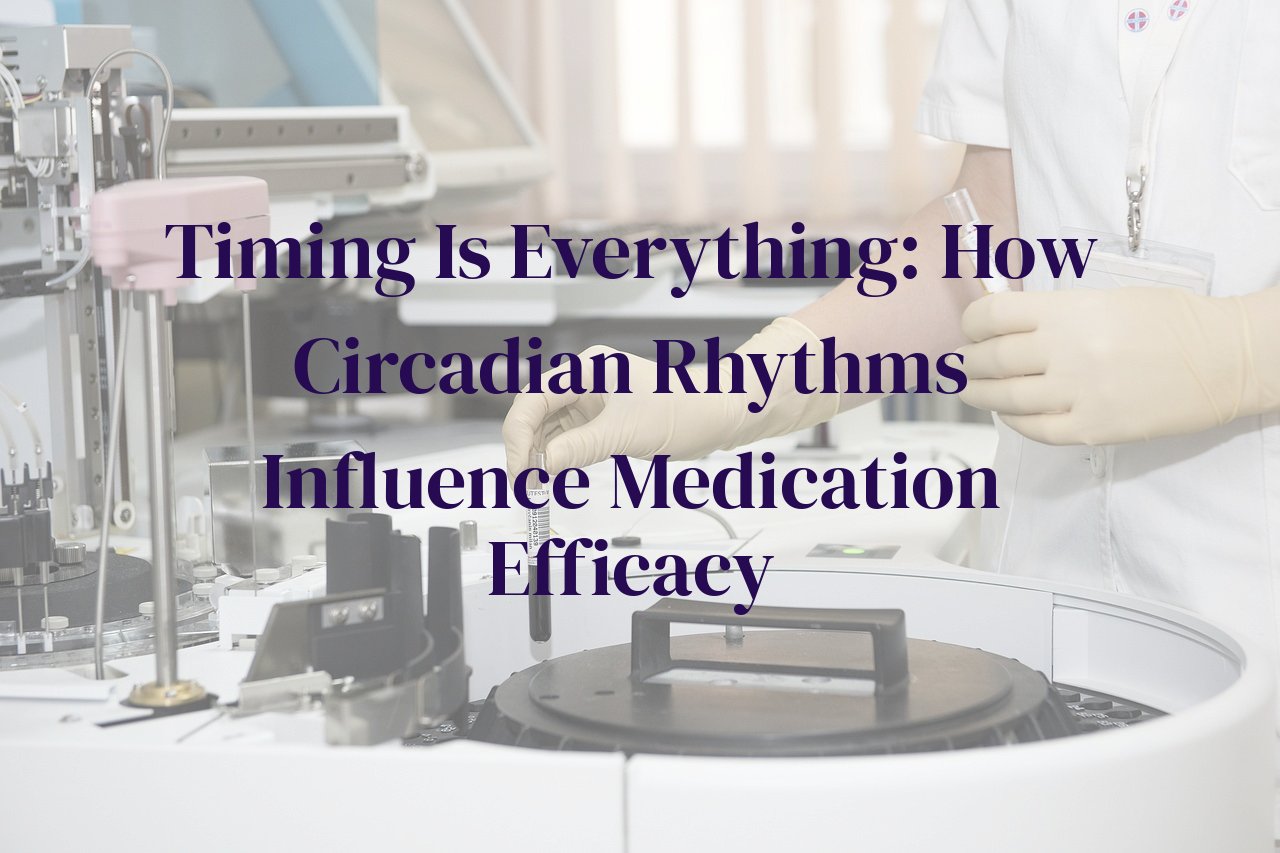
Have you ever wondered why some medicines work better at certain times of the day? In this post, we delve into the intricate dance between circadian rhythms and medication efficacy. We’ll explore how the body’s internal clock can affect the effectiveness of drugs, and why timing your medication can have significant benefits for your health.
By reading this post, you’ll gain insights into optimizing your medication schedule for maximum effectiveness. We’ll cover the science behind circadian rhythms, their impact on drug metabolism, and practical tips for aligning your medicine intake with your body’s natural rhythms. This information could enhance your treatment outcomes and potentially reduce side effects, making you a more informed participant in your healthcare journey.
Table of Contents
Circadian Rhythms: The Body’s Internal Clock
Our bodies are magnificent machines, finely tuned to operate on a set of internal schedules known as circadian rhythms. Imagine having an internal clock that meticulously schedules everything from sleep to hormone release, to even when our organs are at their peak performance.
Circadian rhythms are governed by something known as the suprachiasmatic nucleus (SCN), located in the hypothalamus of the brain. This tiny region acts as the body’s master clock, synchronizing an array of biological processes to align with the 24-hour day-night cycle. Think of it as the conductor of a complex biological orchestra, ensuring each process hits the right note at the right time.
Light is the primary cue that sets and resets these rhythms, impacting the production of hormones like melatonin, which signals to our bodies that it’s time to sleep. When the natural light-dark cycle is disrupted, say by staying up late or traveling across time zones, our internal clock can go haywire, leading to a myriad of health issues from sleep disorders to mood disturbances.
It’s not just about sleep; almost every cell in our body has its own circadian clock, working in sync with the master clock in the brain. For instance, our liver enzymes that metabolize medications function optimally at certain times of the day. If you’ve ever wondered why you’re more energetic in the morning and feel sluggish after lunch, it’s your circadian rhythm at play.
Interestingly, our immune system also follows a circadian pattern. Research has shown that the effectiveness of our immune response varies over the course of the day. This has significant implications for the timing of medication, as some drugs may be more effective when our immune system is naturally more active.
Personally, I’ve always found it fascinating how my energy levels dip and rise predictably throughout the day. Embracing your body’s internal clock by sticking to a regular sleep schedule, eating meals at consistent times, and getting natural light exposure can make a world of difference in overall health and well-being. When we synchronize our activities with our circadian rhythms, rather than fighting against them, we can harness the full potential of our bodies’ natural capabilities.
The Science Behind Medication Metabolism
Thus, the science of medication metabolism, also known as pharmacokinetics, plays a pivotal role in understanding how medications work in our bodies. The term refers to how drugs are absorbed, distributed, metabolized, and eventually excreted. This process is influenced by a myriad of factors, including the time of day we take our medication, which ties closely with our body’s circadian rhythms.
Absorption: The first step in medication metabolism begins with absorption, where the drug enters the bloodstream. Absorption rates can vary depending on the time of day due to fluctuations in gastric pH, gastric motility, and the presence of food in the stomach. For instance, certain medications might be absorbed more efficiently when taken after a meal, whereas others might require an empty stomach for optimal absorption.
Distribution: Once in the bloodstream, the drug is transported to different tissues and organs. This distribution process is influenced by blood flow, which is also subject to circadian variations. For example, during the day, increased cardiac output can enhance the distribution of medications, ensuring they reach their target sites more effectively.
Metabolism: The liver is the primary organ responsible for metabolizing medications, transforming them into metabolites that are easier to excrete. Enzymatic activities in the liver exhibit circadian rhythms, meaning their ability to metabolize drugs can peak or trough at different times. This can impact not only the efficacy but also the toxicity of medications, depending on when they are taken.
Excretion: Finally, the excretion of drugs, primarily through the kidneys, also follows a circadian rhythm. Renal function, including glomerular filtration rate (GFR) and renal blood flow, experiences diurnal variations. As a result, the timing of medication intake can influence the rate at which drugs and their metabolites are eliminated from the body.
Understanding these factors can help healthcare providers tailor medication regimens to align with the patient’s natural biological rhythms. From personal experience, I recall a patient who struggled with hypertension management. By adjusting the timing of his medication to align with circadian variations in blood pressure, we achieved better control and minimized side effects. This anecdote underscores the importance of considering circadian science in medication metabolism for more effective and personalized treatment plans.
The Role of Timing in Medication Efficacy
One of the most fascinating aspects of human biology is the rhythmic interplay of physiological functions with the passage of time. This synchronization is known as a circadian rhythm, an intrinsic 24-hour cycle that governs various bodily processes, including sleep, hormone levels, and core body temperature. When it comes to medication, understanding and leveraging these natural rhythms can profoundly impact the efficacy of treatment.
Consider the example of blood pressure medications. Blood pressure naturally rises in the morning and peaks in the afternoon, aligning with our activity levels. Administering antihypertensives at night can be more effective for some patients, as it provides better control over the morning surge, thereby reducing the risk of cardiovascular events.
Similarly, corticosteroids, often prescribed for conditions like asthma and rheumatoid arthritis, can exhibit more potent effects when taken according to our circadian rhythms. Cortisol, a natural hormone that shares pathways with synthetic corticosteroids, peaks in the early morning. Taking corticosteroids late in the evening can lead to more significant side effects because it disrupts the natural sleep-wake cycle and hormone balance.
The timing of medication administration also plays a critical role in cancer treatments. Chemotherapy drugs, which target rapidly dividing cells, may be more effective when administered at times when cancer cells are most vulnerable. Research in chronotherapy – the study of the effects of circadian rhythms on drug efficacy – has shown that oncologists could increase the tolerability and effectiveness of cancer treatments by timing them to coincide with the patient’s biological clock.
On a personal note, during my practice, I’ve encountered numerous patients who experienced better outcomes once their medication regimen was tailored to their circadian rhythms. Whether it was avoiding nocturnal asthma attacks or morning headaches, the benefits of timing couldn’t be overstated. It takes collaboration and a keen understanding of each patient’s unique rhythms, but the results are remarkable.
In summary, the role of timing in medication efficacy cannot be ignored. A deeper understanding of circadian rhythms can lead to more effective and personalized treatments, ultimately improving patient outcomes and quality of life.
Practical Tips for Synchronizing Medication with Circadian Rhythms
Understanding and harnessing the power of your circadian rhythms can make a significant difference in medication efficacy. Over the years, I’ve encountered numerous instances where simply adjusting the timing of medication administration has enhanced patient outcomes dramatically.
First, consult your healthcare provider. This might sound straightforward, but the importance of this step cannot be overstated. Your doctor, armed with an understanding of your medical history and current treatment plan, can help you determine the best times to take your medications. Their insights pave the way for a more tailored and effective approach.
Secondly, align medication schedules with your natural energy peaks and troughs. For example, many people experience a dip in energy in the early afternoon. Timing medications that require full alertness, or those that might cause drowsiness, around these natural lulls can help mitigate potential side effects.
Embrace the art of chronotherapy. This emerging field focuses on timing medical treatments to mirror the body’s natural rhythms. Research indicates that the timing of certain medications, like blood pressure drugs, can significantly influence their effectiveness. For instance, taking antihypertensives in the evening aligns with the body’s circadian rhythm, leading to better blood pressure control overnight and a reduction in morning surge – a critical time for heart attack and stroke risk.
Another practical tip is to incorporate reminders and technology. Using smartphone apps that sync with your medication schedule can prompt you to take your medications at optimal times. Such apps can also offer the convenience of adjusting alarms based on changes in your routine or travel across time zones, ensuring that you remain consistent despite daily fluctuations.
Pay attention to your eating habits. Certain medications absorb more effectively on an empty stomach, while others might need food to prevent gastrointestinal disturbances. Aligning your medication intake with your meal times while considering your circadian rhythms can enhance both absorption and tolerance.
Finally, consider natural light exposure. Light is a strong regulator of circadian rhythms, so ensuring you receive adequate sunlight, especially in the morning, can help stabilize your internal clock. Consistency in sleep and wake times further supports this, allowing for a predictable rhythm that medication schedules can adhere to, enhancing their efficacy.
Patient Stories: Real-Life Examples
Take Emily, a dynamic marketing manager in her early thirties, battling with a chronic illness requiring daily medication. She noticed fluctuations in her symptoms based on when she took her medicine. After discussing it with her healthcare provider, Emily shifted her medication timing to align with her circadian rhythms. Mornings became more manageable, and her overall well-being improved. This story underscores the importance of understanding one’s body clock in medication management.
Then there’s James, a retired teacher struggling with insomnia and hypertension. Despite strict adherence to his medication regimen, his sleep patterns were a mess, and his blood pressure remained unstable. Upon diving into research and consulting his physician, James adjusted his medication to evening doses, syncing them with his natural melatonin production. The results were remarkable: he slept better and finally achieved stable blood pressure.
Lily, a college student diagnosed with anxiety, found her symptoms peaking in the late afternoon despite consistent medication. A consultation revealed that her anxiety medication reached peak efficacy during the night, misaligned with her anxiety patterns. Shifting her intake to early afternoon balanced the medication’s effect with her anxiety episodes, significantly enhancing her academic performance and social life.
Lastly, consider Raj, a software developer with type 2 diabetes. His glucose levels were erratic, despite rigorous blood sugar monitoring and medication. Suspecting a connection with his erratic work hours, he consulted his endocrinologist and rescheduled his medication to align with his eating habits and work shifts. The synchrony between his circadian rhythms and medication drastically improved his glycemic control.
These stories illuminate the importance of tailoring medication schedules to an individual’s circadian rhythms. Each narrative presents a unique intersection of personal health management and the intricate dance of the body’s internal clock. They not only emphasize the scientific principle but also resonate emotionally with readers, offering comfort and solutions grounded in real-life experiences.
Conclusion
Understanding the significance of circadian rhythms in medication efficacy can transform the way you manage your health. By aligning your medication schedule with your body’s natural cycles, you can enhance the effectiveness of your treatments and potentially reduce unwanted side effects. Remember, timing truly is everything when it comes to taking your medications. Take control of your health by becoming more attuned to your body’s internal clock.



